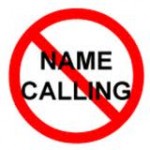 As a child, growing up within a Nigerian family (first generation to be born within the UK) I had quite a mixed upbringing. My mother was the vocal type and she didn’t spare the name calling to us her children. If for example you done chores slow, you would be told’ “Why are you behaving like Dundee, you are Dundee United!” Or, if you were a bed-wetter (as I unfortunately was), “Atole” and other name calling (unmentionables)” were the order of the day.
As a child, growing up within a Nigerian family (first generation to be born within the UK) I had quite a mixed upbringing. My mother was the vocal type and she didn’t spare the name calling to us her children. If for example you done chores slow, you would be told’ “Why are you behaving like Dundee, you are Dundee United!” Or, if you were a bed-wetter (as I unfortunately was), “Atole” and other name calling (unmentionables)” were the order of the day.
Their are those that didn’t hit 100% or make 1st position in the year end results (were Olodo’s or dunces). The funny thing about this name calling is that it was not unique to our household. Many Nigerians I have spoken to can recount similar experiences. God forbid if someone had a disabled or special needs child! They really got the full blast of many a tongue lashing (Nigerians are loud enough to let the person with extra needs hear their thoughts on what should be an unspoken word.)
Mum later on in my adult life mentioned that it was how she was brought up with being called names and it was normal for a Nigerian upbringing, that if at home they didn’t call you names, the school teachers would? Let me know your thoughts on whether this is your experience.
Defining personality flaws or characteristics as a tool to brand or name a child is not polite. It doesn’t promote strong characteristics in a child. If a name is warm and endearing like, “young doctor” for someone that aspires to be a medic, or, for a child that is struggling academically “clever clogs.” You may think as a parent or teacher that you cannot speak or call a name to a child that is showing the opposite traits of what they are. Well, I see it as speaking life into the situation and to the child’s life.
Detriment name calling is cruel and hurtful. If you want to give someone a nickname it should make the receiver smile, not retreat and feel condemned. If you want to call a child by a nickname then it should be a child you know or like or teach. It should be borne of love.
Etiquette Guidelines – For Names
If you are not calling the child by their given or birth name and want to use another name for the child;
Focus on a positive trait, strong point or excellent characteristic – names should not focus on disabilities or weak points. Mrs Big head is real cruel for a girl that has “in your eyes” a large head than the norm. Similarly, calling someone who has a special needs dumb or handicap does harm to their self-esteem.
What type of person are you? – Detrimental name calling to children, household or corporate environment staff is what bullies do. You know they cannot or will not answer you back, its a form of bullying and belittling. Desist if this is your normal practice.
Name longevity – When my children were between 5 – 6 they love Dragonballz and Digimon (so we called them that) when they asked to watch their cartoon super heroes on TV. We had the good sense to know there is an end date for “soppy” names.. Not all brilliant nicknames take hold and even if they do – one day recognise that the child or person has changed and therefore should the name you are calling them.
If a girl was nicknamed for example, “Pink Barby” when she was 6 years old. I would think when they are a mother of 2 and having been married 20 years – that name should have expired decades before!
Uncomfortable? My last born for some years was called, “my baby” but he politely asked me (last week) not to call him that as he is a grown many nearly finishing university and the name is not appropriate Well that told me! I had long used a name that should have been abandoned as the recipient (my son) hated it. He scowled every time the nickname was used so I quickly discarded it. Be sensitive that the receiver might feel uncomfortable requesting that people don’t use the nickname, be sensitive to non-verbal cues.
Lola Alli
Expresslearningcentre.com
@EtiquetteCentre
Author of Nurturing Progressive Achievers



